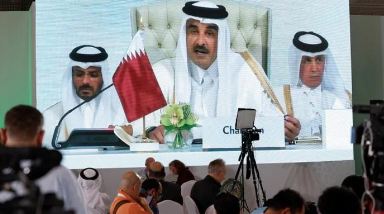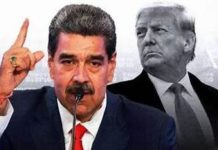The Arab-Islamic Summit convened in Doha on Monday September 15, 2025, just days after an unprecedented Israeli attack shook the Qatari capital. Leaders and high-level delegations from across the Muslim world, including Saudi Crown Prince Mohammed bin Salman, Pakistani Prime Minister Shehbaz Sharif, Turkish President Recep Tayyip Erdoğan, and heads of state from dozens of other Muslim-majority countries, gathered in a rare display of solidarity.
The event, billed as a show of power and unity, came at a moment of heightened tensions in the region. The attack on Doha not only raised questions about Israel’s audacity but also about the broader security guarantees traditionally extended to Qatar by its Western allies, particularly the United States. Against this backdrop, the summit carried both symbolic and strategic significance, as Muslim leaders attempted to send a clear message to Israel and its backers: another such aggression would not go unanswered.
From the moment the summit opened, the optics were striking. The assembly of nearly all major Muslim leaders under one roof was in itself a political statement. Delegations from the Gulf Cooperation Council (GCC), North Africa, South Asia, and Central Asia underscored the breadth of Muslim representation.
The Saudi Crown Prince, seated alongside the Emir of Qatar, emphasized that the attack on Doha was not merely an assault on a sovereign nation but an affront to the dignity of the entire Muslim world. Similarly, Prime Minister Shehbaz Sharif reiterated Pakistan’s “unwavering support for Qatar” and called for “collective defense mechanisms” to safeguard Muslim states against external threats. Turkish President Erdoğan, never one to mince words on Israel, described the attack as “state terrorism carried out under the shield of American protection.”
The speeches and the carefully staged displays of fraternity projected an image of resilience. The symbolism mattered: Muslim leaders wanted Israel and the United States to know that while internal divisions persist, there is a line beyond which provocations could unify even the most disparate actors.
At the core of the summit was the warning delivered to both Israel and Washington. A joint communiqué released at the end of the session noted that “continued provocations against the sovereignty of Muslim nations will invite resolute responses.” Though carefully worded, the statement carried an implicit threat: further aggression might push the Muslim world toward collective retaliation.
Analysts observed that the summit’s timing and strong language were meant as much for Washington as for Tel Aviv. For decades, the United States has styled itself as the security guarantor of Gulf states, particularly Qatar, where it maintains the Al Udeid Air Base — one of its largest military facilities in the region. Yet when Israel struck Doha, Washington failed to protect its ally, instead appearing to side with Tel Aviv.
This failure has triggered introspection in Doha. “If the U.S. cannot protect Qatar against Israel, then who exactly can it protect us from?” asked one Qatari commentator. The implication is sobering: Qatar may need to reconsider the value of its security partnership with Washington, especially if American guarantees are conditional on Israeli interests.
Yet for all the powerful rhetoric and the spectacle of unity, the summit fell short of the bold outcomes many observers had anticipated. In the days leading up to the gathering, speculation swirled that Muslim nations might announce concrete measures: suspension of diplomatic ties with Israel, economic sanctions, or even coordinated security initiatives.
None of these materialized. Instead, the final communiqué was heavy on symbolism but light on actionable commitments. States that had normalized relations with Israel in recent years — including the United Arab Emirates, Bahrain, Morocco, and others — did not announce any rollback of ties. Despite calls from civil society groups and ordinary citizens across the Muslim world, these governments opted for caution.
The reason was not difficult to discern. U.S. pressure loomed large over the summit. Washington’s influence in the Gulf and across the Muslim world remains substantial, bolstered by military bases, economic partnerships, and diplomatic leverage. Even leaders most angered by Israel’s actions were reluctant to risk jeopardizing relations with the United States.
An important dimension of the summit was the conspicuous position of Iran. While nearly every Muslim state aligned cautiously with U.S. preferences, Tehran adopted a more uncompromising tone, openly urging Muslim countries to sever ties with Israel and to pursue retaliatory measures. Iranian leaders warned that “appeasement today will only embolden further aggression tomorrow.”
This posture set Iran apart but also underscored the divisions within the Muslim bloc. Many Arab states remain wary of Iran’s regional ambitions, making it difficult to forge consensus on how to confront Israel. The result is a paradox: while the summit projected unity outwardly, internally it reflected the same fault lines that have long plagued Muslim solidarity on the Palestinian and broader Middle Eastern question.
In the immediate sense, the summit achieved its tactical objectives. It conveyed anger, solidarity, and the warning that Muslim nations would not remain passive if Israel repeated its attack. The gathering also put Israel under diplomatic pressure, drawing international media attention and amplifying the costs of Tel Aviv’s actions.
But strategically, the event was a disappointment. By failing to adopt concrete punitive measures, the Muslim world signaled its limitations. The gap between rhetoric and action was glaring. While leaders spoke of collective strength, the reality remained that most of them were unwilling to cross Washington’s red lines.
For Qatar, the summit raised as many questions as it answered. The emirate has long relied on U.S. security guarantees, yet the attack on Doha has exposed the fragility of that arrangement. Going forward, Qatar may seek to diversify its security partnerships, possibly drawing closer to Turkey or even exploring cautious engagement with Iran.
For the broader Muslim world, the challenge remains how to transform symbolic unity into actionable strategy. Unless Muslim states are willing to collectively resist U.S. pressure, their ability to influence Israel’s behavior will remain limited.
The Doha summit, then, will likely be remembered as both a moment of solidarity and a missed opportunity. It showcased the Muslim world’s potential power but also laid bare its dependence on external actors. The message to Israel and the United States was sharp, but without action to back it up.

















